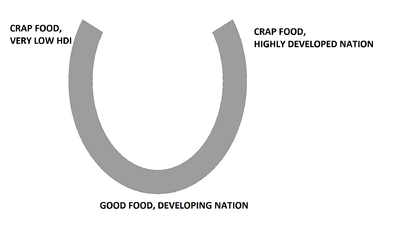jellybalm69
kiwifarms.net
- Joined
- Jul 16, 2022
I feel like there is a moderate case to be made for a horseshoe theory between the cuisine and the level of development of a country.
For example, both Sub-Saharan Africa and Scandinavia's cuisine is largely unappetizing but are polar opposites in terms of development, whereas countries in the Middle East, South America and most of Asia have pretty good food but are somewhere in the middle (i.e they're still somewhat despotic shitholes but have an average to high HDI).
That being said, there are likely many exceptions to this trend that haven't occurred to me in the past 2 minutes I've been thinking about this.
Crude diagram:

Is there something to do it? Or am I just having a bout of apophenia?
For example, both Sub-Saharan Africa and Scandinavia's cuisine is largely unappetizing but are polar opposites in terms of development, whereas countries in the Middle East, South America and most of Asia have pretty good food but are somewhere in the middle (i.e they're still somewhat despotic shitholes but have an average to high HDI).
That being said, there are likely many exceptions to this trend that haven't occurred to me in the past 2 minutes I've been thinking about this.
Crude diagram:

Is there something to do it? Or am I just having a bout of apophenia?
